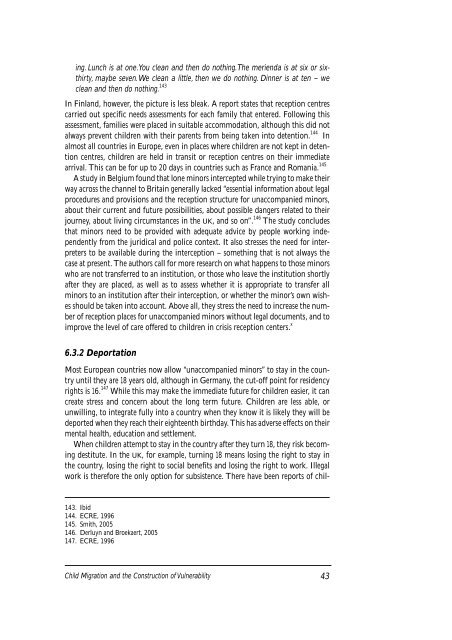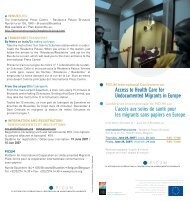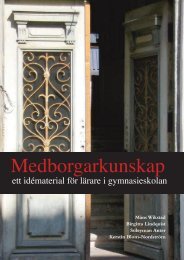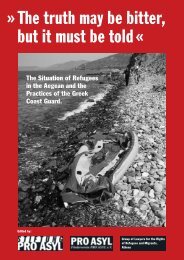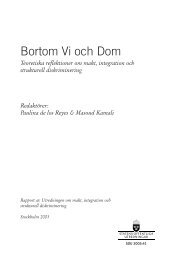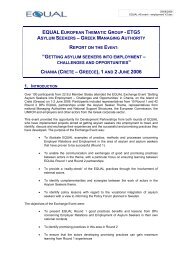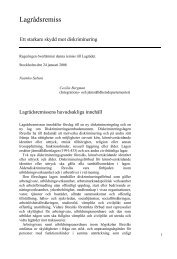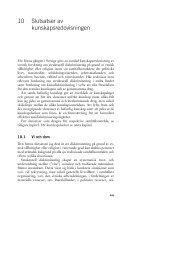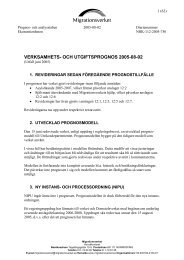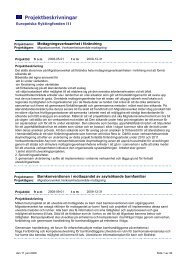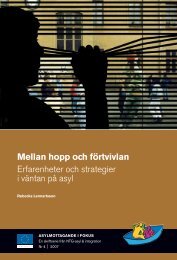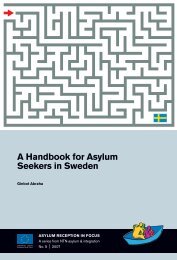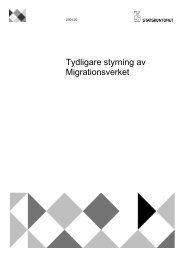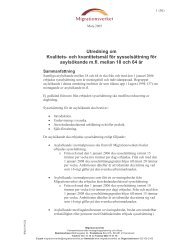and the Construction of Vulnerability - Child Trafficking
and the Construction of Vulnerability - Child Trafficking
and the Construction of Vulnerability - Child Trafficking
Create successful ePaper yourself
Turn your PDF publications into a flip-book with our unique Google optimized e-Paper software.
ing. Lunch is at one.You clean <strong>and</strong> <strong>the</strong>n do nothing.The merienda is at six or sixthirty,<br />
maybe seven.We clean a little, <strong>the</strong>n we do nothing. Dinner is at ten – we<br />
clean <strong>and</strong> <strong>the</strong>n do nothing. 143<br />
In Finl<strong>and</strong>, however, <strong>the</strong> picture is less bleak. A report states that reception centres<br />
carried out specific needs assessments for each family that entered. Following this<br />
assessment, families were placed in suitable accommodation, although this did not<br />
always prevent children with <strong>the</strong>ir parents from being taken into detention. 144<br />
In<br />
almost all countries in Europe, even in places where children are not kept in detention<br />
centres, children are held in transit or reception centres on <strong>the</strong>ir immediate<br />
arrival. This can be for up to 20 days in countries such as France <strong>and</strong> Romania. 145<br />
A study in Belgium found that lone minors intercepted while trying to make <strong>the</strong>ir<br />
way across <strong>the</strong> channel to Britain generally lacked “essential information about legal<br />
procedures <strong>and</strong> provisions <strong>and</strong> <strong>the</strong> reception structure for unaccompanied minors,<br />
about <strong>the</strong>ir current <strong>and</strong> future possibilities, about possible dangers related to <strong>the</strong>ir<br />
journey, about living circumstances in <strong>the</strong> UK, <strong>and</strong> so on”. 146 The study concludes<br />
that minors need to be provided with adequate advice by people working independently<br />
from <strong>the</strong> juridical <strong>and</strong> police context. It also stresses <strong>the</strong> need for interpreters<br />
to be available during <strong>the</strong> interception – something that is not always <strong>the</strong><br />
case at present. The authors call for more research on what happens to those minors<br />
who are not transferred to an institution, or those who leave <strong>the</strong> institution shortly<br />
after <strong>the</strong>y are placed, as well as to assess whe<strong>the</strong>r it is appropriate to transfer all<br />
minors to an institution after <strong>the</strong>ir interception, or whe<strong>the</strong>r <strong>the</strong> minor’s own wishes<br />
should be taken into account. Above all, <strong>the</strong>y stress <strong>the</strong> need to increase <strong>the</strong> number<br />
<strong>of</strong> reception places for unaccompanied minors without legal documents, <strong>and</strong> to<br />
improve <strong>the</strong> level <strong>of</strong> care <strong>of</strong>fered to children in crisis reception centers. x<br />
6.3.2 Deportation<br />
Most European countries now allow “unaccompanied minors” to stay in <strong>the</strong> country<br />
until <strong>the</strong>y are 18 years old, although in Germany, <strong>the</strong> cut-<strong>of</strong>f point for residency<br />
rights is 16. 147 While this may make <strong>the</strong> immediate future for children easier, it can<br />
create stress <strong>and</strong> concern about <strong>the</strong> long term future. <strong>Child</strong>ren are less able, or<br />
unwilling, to integrate fully into a country when <strong>the</strong>y know it is likely <strong>the</strong>y will be<br />
deported when <strong>the</strong>y reach <strong>the</strong>ir eighteenth birthday. This has adverse effects on <strong>the</strong>ir<br />
mental health, education <strong>and</strong> settlement.<br />
When children attempt to stay in <strong>the</strong> country after <strong>the</strong>y turn 18, <strong>the</strong>y risk becoming<br />
destitute. In <strong>the</strong> UK, for example, turning 18 means losing <strong>the</strong> right to stay in<br />
<strong>the</strong> country, losing <strong>the</strong> right to social benefits <strong>and</strong> losing <strong>the</strong> right to work. Illegal<br />
work is <strong>the</strong>refore <strong>the</strong> only option for subsistence. There have been reports <strong>of</strong> chil-<br />
143. Ibid<br />
144. ECRE, 1996<br />
145. Smith, 2005<br />
146. Derluyn <strong>and</strong> Broekaert, 2005<br />
147. ECRE, 1996<br />
<strong>Child</strong> Migration <strong>and</strong> <strong>the</strong> <strong>Construction</strong> <strong>of</strong> <strong>Vulnerability</strong><br />
43


